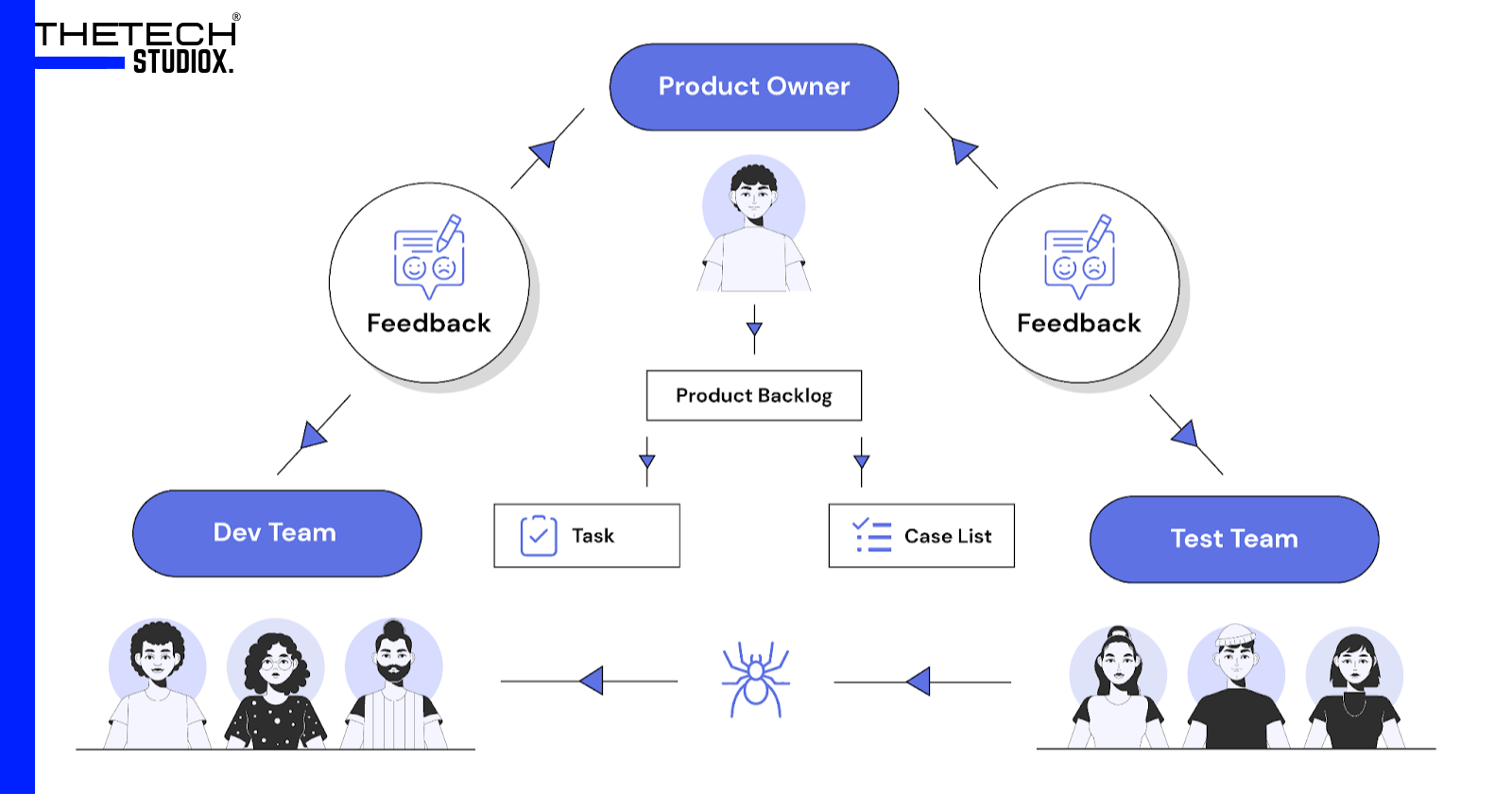Table of Contents
Introduction to the Role of a Product Owner
In the rapidly evolving landscape of the software business, the role of a product owner has gained significant prominence. With a projected 10% increase in demand for skilled product owners over the next decade, many developers are eyeing a transition to this pivotal role. As we step into 2024, the need for adept product owners is set to soar, making it an opportune moment for developers to explore a career shift toward product ownership.
Understanding the Role of a Product Owner
What is a Product Owner?
A product owner assumes a specialized role within the agile framework. They oversee product development, set task priorities for developers, and collaborate closely with scrum masters and development teams. Crucially, they steer product development strategies, ensuring alignment with end-user preferences and a focus on delivering exceptional user experiences.
Transitioning to a Product Owner Role
Transitioning from a developer to a product owner unlocks a multitude of opportunities beyond coding. It not only enhances professional growth but also grants involvement in critical decision-making processes throughout the product development lifecycle.
Advantages of Becoming a Product Owner
1. Decision-Making Authority: Transitioning to a product owner role grants significant decision-making authority. Product owners have the autonomy to prioritize features and functionalities based on both company objectives and user needs. This authority allows them to steer the direction of product development, ensuring that resources are allocated efficiently to meet strategic goals.
2. Higher Compensation: One of the notable perks of being a product owner is the potential for higher compensation. Compared to developer roles, product owners typically command a higher salary due to their increased responsibilities and leadership positions within the product development team. This financial incentive reflects the value placed on their strategic contributions to the organization.
3. Strategic Implications: Product owners play a pivotal role in shaping the long-term vision of a product. By conducting thorough market research, competitive analysis, and gathering user feedback, they inform strategic decisions that drive product evolution. This involvement in strategic planning ensures that products remain relevant and competitive in dynamic markets, enhancing the organization’s overall success.
4. Problem-Solving Skills: The challenges encountered as a product owner offer valuable opportunities for skill development, particularly in problem-solving. Product owners must navigate shifting priorities, evolving market demands, and conflicting stakeholder interests. By devising creative solutions to these challenges, they hone their problem-solving skills and contribute to the overall success of the product and organization.
5. Career Growth Opportunities: Becoming a product owner opens doors to diverse career growth opportunities. Beyond technical proficiency, product owners develop a comprehensive understanding of business dynamics, market trends, and user behavior. This broad skill set equips them for roles in product management, project leadership, and executive positions, paving the way for continued professional advancement.
6. Impactful Contributions: Product owners have the opportunity to make meaningful contributions to product development and innovation. By championing user-centric design principles and advocating for customer needs, they ensure that products deliver value and exceed user expectations. This ability to directly influence product outcomes fosters a sense of fulfillment and accomplishment in their work.
7. Cross-functional collaboration: In their role as product owners, individuals have the opportunity to collaborate with diverse teams and stakeholders across the organization. From developers and designers to marketing specialists and executives, product owners bridge the gap between technical expertise and business objectives. This cross-functional collaboration fosters creativity, fosters a collaborative work culture, and drives collective success.
8. Personal Development: Transitioning to a product owner role offers ample opportunities for personal development and growth. From honing leadership and communication skills to expanding strategic thinking and decision-making abilities, product owners continuously evolve professionally. This ongoing development journey enhances their effectiveness as leaders and contributes to their overall career satisfaction.
Roles and Responsibilities of a Product Owner
1. Product Vision: A product owner is responsible for defining and articulating the vision for the product. This involves understanding market needs, customer preferences, and business objectives to create a clear and compelling vision that guides the development team.
2. Stakeholder Management: Effective stakeholder management is crucial for a product owner. They must engage with stakeholders from various departments, including executives, marketing, sales, and customer support, to gather feedback, align priorities, and ensure buy-in for the product vision.
3. Product Backlog Management: The product backlog serves as a prioritized list of tasks, features, and enhancements that need to be implemented in the product. The product owner is responsible for maintaining and prioritizing the backlog based on input from stakeholders, market trends, and user feedback.
4. Requirements Gathering and Prioritization: Gathering and prioritizing requirements is a key responsibility of the product owner. They must collaborate with stakeholders to understand their needs, translate them into actionable requirements, and prioritize them based on business value and strategic objectives.
5. Sprint Planning: During sprint planning meetings, the product owner works with the development team to identify the most important items from the product backlog to be included in the upcoming sprint. They provide clarity on requirements, answer questions, and ensure that the team has a clear understanding of what needs to be delivered.
6. Sprint Review and Feedback: After each sprint, the product owner participates in the sprint review meeting to inspect the work completed by the development team and gather feedback from stakeholders. This feedback informs future iterations of the product and helps prioritize upcoming work.
7. User Experience (UX) Design: While product owners are not typically responsible for designing user interfaces, they play a critical role in ensuring that the product delivers a positive user experience. They work closely with UX designers to define user personas, review wireframes and prototypes, and provide feedback to ensure that the product meets user needs and expectations.
8. Release Planning: Product owners collaborate with the development team to plan and coordinate product releases. They prioritize features and enhancements based on business objectives, technical constraints, and market demands to create a roadmap for product releases.
9. Continuous Improvement: Product owners are advocates for continuous improvement. They actively seek feedback from stakeholders and users, monitor key performance indicators, and identify opportunities to enhance the product. By iterating on the product based on feedback and data, they ensure that it remains competitive and relevant in the marketplace.
10. Market Analysis: Understanding market trends, competitor offerings, and customer behavior is essential for a product owner. They conduct market analysis to identify opportunities for innovation, assess competitive threats, and make informed decisions about the direction of the product.
Common Skills of Developers and Product Owners
1. Communication
Both developers and product owners require strong communication skills to effectively convey ideas, requirements, and feedback. Clear communication fosters collaboration, ensures alignment with stakeholders, and facilitates successful project outcomes.
2. Problem-Solving
Proficiency in problem-solving is essential for both developers and product owners. Developers use problem-solving skills to troubleshoot technical issues, debug code, and implement effective solutions. Product owners apply problem-solving skills to address challenges related to stakeholder expectations, changing market dynamics, and product development priorities.
3. Technical Understanding
While product owners may not be as deeply involved in coding as developers, they benefit from a fundamental understanding of technical concepts and software development processes. This enables product owners to engage meaningfully with development teams, understand technical constraints, and make informed decisions about product features and functionality.
4. Adaptability
In dynamic and fast-paced environments, adaptability is a valuable skill shared by developers and product owners. Both roles must respond to changing requirements, evolving technologies, and shifting priorities. Adaptability enables individuals to embrace change, adjust strategies as needed, and effectively navigate uncertainty.
5. Collaboration
Collaboration is essential for success in both development and product ownership roles. Developers collaborate within cross-functional teams to brainstorm solutions, share knowledge, and deliver high-quality software products. Product owners collaborate with stakeholders, development teams, and other stakeholders to gather requirements, prioritize work, and ensure alignment with strategic goals.
6. Analytical Thinking
Analytical thinking skills are critical for developers and product owners alike. Developers use analytical thinking to analyze code, identify patterns, and optimize performance. Product owners apply analytical thinking to interpret market data, assess user feedback, and make data-driven decisions about product features and enhancements.
7. Attention to Detail
Attention to detail is a shared trait among developers and product owners. Developers meticulously review code, identify bugs, and ensure the accuracy and completeness of their work. Product owners pay close attention to requirements, user feedback, and market trends to ensure that the product meets quality standards and user expectations.
8. Leadership
While developers may not always have formal leadership roles, they often demonstrate leadership qualities within their teams by taking initiative, providing guidance, and supporting their colleagues. Product owners, on the other hand, hold leadership positions within the product development process, guiding the direction of the product, and motivating teams to achieve their goals.
9. Customer Focus
Both developers and product owners share a focus on the end-user or customer. Developers strive to create software that meets user needs, enhances usability, and delivers value. Product owners prioritize features and enhancements based on customer feedback, market research, and user behavior, ensuring that the product remains competitive and user-centric.
10. Creativity
Creativity is a valuable skill for developers and product owners alike. Developers harness creativity to design elegant solutions, optimize performance, and solve complex technical challenges. Product owners apply creativity to envision innovative product features, differentiate the product in the marketplace, and drive product success.

How to Become a Product Owner
1. Acquire Fundamental Knowledge: Before aspiring to become a product owner, it’s essential to gain a foundational understanding of key areas such as business analytics, software development, product management, and the product development life cycle. This knowledge forms the basis for making informed decisions and handling practical situations effectively.
2. Develop Business Analysis Skills: Business analysis skills are crucial for product owners as they involve identifying and interpreting stakeholder requirements, collecting and prioritizing user input, and aligning these needs with the overall product vision. Developing proficiency in business analysis enhances your ability to make strategic decisions and prioritize features effectively.
3. Gain Software Development Insights: A solid understanding of software development principles and practices is invaluable for product owners. Familiarize yourself with technical concepts, methodologies, and tools used in software development to facilitate productive discussions with development teams, assess project feasibility, and contribute meaningfully to technical discussions.
4. Learn About the Product Management Process: Product management encompasses various aspects such as market research, competitive analysis, product planning, and customer engagement. Familiarize yourself with product management frameworks, methodologies, and best practices to gain insights into the strategic aspects of product ownership and decision-making.
5. Enhance Project Management Skills: Effective project management skills are essential for product owners to plan, coordinate, and execute tasks efficiently. Develop competencies in project planning, scheduling, risk management, and stakeholder communication to ensure successful product delivery within scope, time, and budget constraints.
6. Get Professional Training: Investing in professional training programs can provide structured learning paths and industry-recognized certifications that enhance your credibility as a product owner. Enroll in courses focused on Agile frameworks, particularly Scrum, which offer specialized certifications such as Certified Scrum Product Owner (CSPO) or Professional Scrum Product Owner (PSPO).
7. Build Relationships with the Agile Community: Engaging with the Agile community offers valuable opportunities for networking, learning, and skill development. Participate in Agile events, conferences, meetups, and online forums to connect with industry professionals, gain insights into emerging trends, and share experiences with fellow practitioners.
8. Seek Mentorship: Seek mentorship from experienced product owners who can provide guidance, advice, and practical insights into the role. Mentors can offer personalized support, share real-world experiences, and help navigate challenges encountered during your journey to becoming a product owner.
9. Develop Soft Skills: In addition to technical expertise, soft skills play a critical role in the success of product owners. Prioritize the development of communication, negotiation, leadership, and problem-solving skills to effectively collaborate with cross-functional teams, engage stakeholders, and navigate complex project dynamics.
10. Apply for Entry-Level Product Owner Positions: Once you have acquired the necessary knowledge, skills, and certifications, start applying for entry-level product owner positions that align with your background and interests. Highlight your relevant experience, training, and qualifications in your resume and cover letter to demonstrate your suitability for the role.
11. Showcase Transferable Skills: Emphasize transferable skills gained from previous roles or experiences that are relevant to product ownership, such as analytical thinking, decision-making, and customer focus. Highlight how these skills enable you to bridge the gap between technical requirements and business objectives, making you an asset to the product development team.
12. Continuously Learn and Adapt: Product ownership is a dynamic and evolving field, requiring continuous learning and adaptation to stay relevant. Stay updated on industry trends, emerging technologies, and best practices in product management to enhance your skills and maintain a competitive edge in the marketplace.
Challenges of Being a Product Owner
1. Time Management: Product owners often face the challenge of managing multiple tasks and priorities within tight deadlines. Balancing strategic planning, stakeholder meetings, backlog grooming, and sprint reviews require effective time management skills to ensure that all responsibilities are addressed efficiently without compromising product quality.
2. Stakeholder Alignment Struggles: Achieving alignment among diverse stakeholders with varying interests and priorities can be a significant challenge for product owners. Balancing the needs of customers, business executives, development teams, and other stakeholders while maintaining a cohesive product vision requires strong communication, negotiation, and conflict-resolution skills.
3. Market Adaptation: Keeping pace with rapidly evolving market trends, technological advancements, and changing customer preferences presents an ongoing challenge for product owners. Adapting the product strategy, feature roadmap, and development priorities to remain competitive in dynamic markets requires continuous market analysis, strategic planning, and flexibility to respond to emerging opportunities and threats.
4. Product Backlog Management: Managing the product backlog effectively is a critical challenge for product owners. Prioritizing features, user stories, and enhancements based on business value, customer feedback, and market demand while ensuring alignment with strategic objectives requires careful planning, stakeholder collaboration, and ongoing refinement to maintain a balanced and manageable backlog.
5. Decision-Making Complexity: Product owners often encounter complex decision-making scenarios involving trade-offs between competing priorities, resource constraints, and technical feasibility. Making informed decisions that optimize product value, mitigate risks, and align with stakeholder expectations requires analytical thinking, problem-solving skills, and the ability to weigh multiple factors simultaneously.
6. Managing Expectations: Managing stakeholders’ expectations, including customers, executives, and development teams, can be challenging for product owners. Balancing competing demands, addressing conflicting feedback, and communicating realistic timelines and deliverables requires empathy, transparency, and effective stakeholder management to foster trust and collaboration.
7. Scope Creep and Feature Creep: Scope creep and feature creep pose significant challenges for product owners, leading to project delays, budget overruns, and decreased product quality. Managing scope changes, prioritizing feature requests, and maintaining a clear focus on delivering value to customers while avoiding unnecessary complexity require vigilance, discipline, and effective scope management practices.
8. Technical Constraints: Navigating technical constraints, such as legacy systems, technical debt, and platform limitations, can present obstacles to product innovation and delivery. Collaborating closely with development teams, understanding technical constraints, and exploring creative solutions to technical challenges are essential for product owners to effectively navigate and overcome these constraints.
9. Feedback Management: Effectively managing feedback from customers, stakeholders, and development teams is a challenge for product owners. Filtering actionable feedback from noise, prioritizing feedback based on impact and strategic objectives, and incorporating feedback into iterative product improvements require active listening, empathy, and a customer-centric mindset.
10. Balancing Short-Term and Long-Term Goals: Balancing short-term deliverables with long-term strategic goals can be challenging for product owners. Prioritizing incremental improvements, addressing immediate customer needs, and investing in longer-term initiatives that align with the product vision require strategic planning, foresight, and the ability to balance short-term gains with long-term sustainability and growth.
Conclusion
Transitioning from a developer to a product owner demands additional skills and a shift in mindset. By bridging the gap between technical expertise and business acumen, product owners play a pivotal role in guiding development teams towards success. Continuous learning, adaptability, and a user-centric approach are pivotal for thriving in this dynamic role.
Also Read: Databases to Learn in 2024: The Tech Landscape for Career Growth
FAQs
Can anyone transition from a developer to a product owner role?
Transitioning to a product owner role requires a blend of technical expertise, soft skills, and a keen understanding of business dynamics.
What certifications are beneficial for aspiring product owners?
Certifications like Certified Scrum Product Owner (CSPO) and Professional Scrum Product Owner (PSPO) are highly regarded in the industry.
How important is prior development experience for a product owner?
Prior development experience provides valuable insights and facilitates effective collaboration with development teams but is not necessarily a prerequisite for success.
What soft skills are crucial for aspiring product owners?
Effective communication, adaptability, and problem-solving skills are indispensable for navigating the complexities of the product owner role.
What strategies can help developers transition smoothly to a product owner role?
Investing in professional training, building relationships within the Agile community, and emphasizing transferable skills during job applications can facilitate a seamless transition.





[…] The Role of a Product Owner: Challenges and Strategies | Expert Insights […]